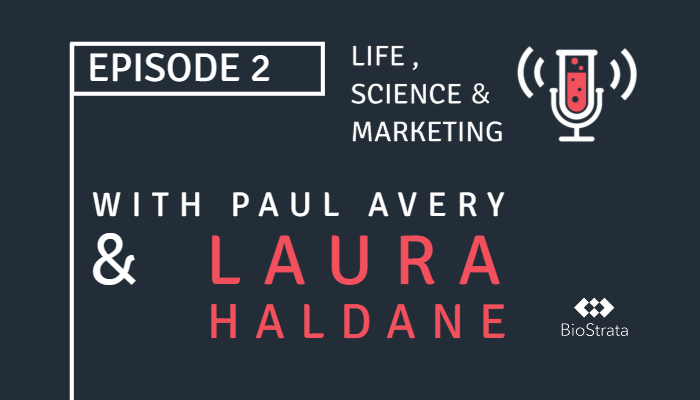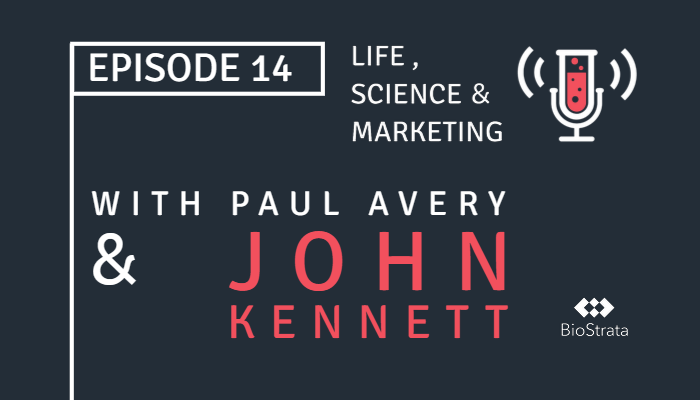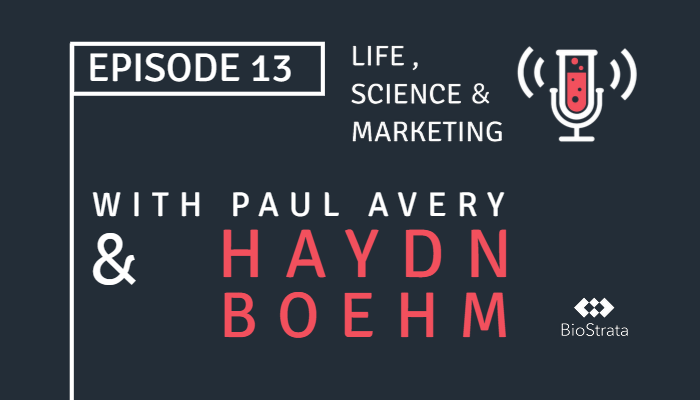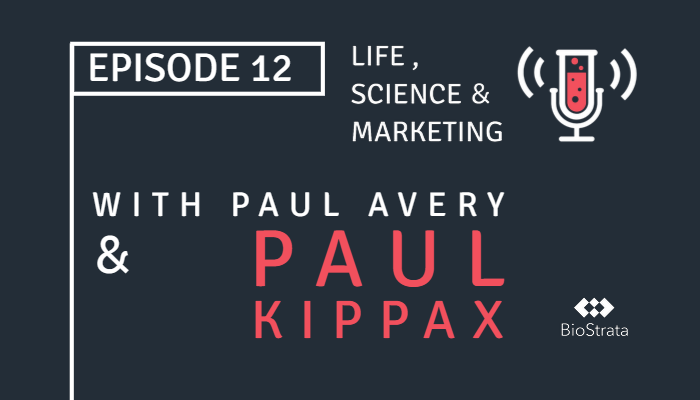Laura Haldane: From psychology to entrepreneurship, top tips on scientist networking, and LinkedIn tactics for global marketing success
Our new podcast, "Life, Science and Marketing", airs every other week and is hosted by our CEO Paul Avery. In each episode, Paul has in-depth discussions with prominent science marketing professionals from around the world. They share details about their personal and professional journeys, the scientific fields that motivate them, and their best marketing advice and strategies.
In our latest episode, Paul had an informative chat with Laura Haldane, co-founder and VP of Sales & Marketing at SciLEADS. With a background in psychology and inspired by her childhood entrepreneurial dreams, Laura ended up forging a successful career in life science sales and marketing. She eventually combined her expertise with the technical know-how of her co-founders to launch the lead generation platform SciLEADS in 2015.
During her chat with Paul, Laura shares insightful anecdotes and advice about her journey, from hacking sales strategies in Scandinavia to leveraging her role as a Game of Thrones extra for LinkedIn networking. She also provides a fascinating glimpse into the busy lives of scientists and effective tactics for engaging with them.
Continue reading for a summary of episode 2 with Laura. Alternatively, if you’d prefer, you can immerse yourself in the full podcast episode below or subscribe on your favourite podcast platform.
What did you study at university and what led you to a career in sales and marketing?
Laura Haldane: I did my degree in psychology at Queen's University, Belfast. I chose psychology because at the time I really wanted to get into software sales, even though it's an odd career choice for a child to aspire to. I was obsessed with Richard Branson and his autobiography "Losing My Virginity" when I was young, so I always wanted to be an entrepreneur. When it came time to choose a degree, I didn't know what would get me into entrepreneurship, so I picked psychology since it seemed interesting and I thought it could help me with sales and marketing.
Although my husband who is a physicist disagrees, psychology is technically considered a science degree. We did lab reports and learned about scientific writing, so it provided that scientific foundation. After university, a local life sciences company called Randox was offering interviews to anyone with a first-class science degree, so that's how I first got into the industry. I started in their graduate program, which rotated me through different departments like marketing and sales. Once I tried sales, I knew that was what I wanted to pursue long-term.
How did you end up co-founding SciLEADS?
Laura Haldane: After working in sales roles at a few life science companies, I reconnected with Daniel, who I had worked with previously. We had always talked about starting a business together. He had the idea to automate the lead generation work I used to do manually, since it was very time consuming. I introduced him to James, another friend I've known since childhood who is our CTO. Once Daniel built an initial version of the platform, I came on board to sell it.
SciLEADS provides automated lead generation for science and engineering companies. The platform incorporates scientific context like publications, materials used, and conferences attended to allow for more targeted outreach. One of the key features shows what equipment labs in the US are investing in, since that information is publicly available there. We built SciLEADS to solve our own pain points from working in sales and marketing roles, so we inherently knew what would be useful.
Outside of work, what are you passionate about?
Laura Haldane: Gardening and dog rescue are two big passions when I’m not working. I love growing things from seeds in my greenhouse and tending to my garden. Working remotely enables me to listen in on work calls while I’m outside gardening! My husband and I are also very involved with dog rescue organisations here in Ireland. We foster dogs regularly, promote adoptions on social media, and try to raise awareness. Running pet adoption pages actually helps me stay fresh with marketing too.
What's the most interesting product or project you've worked on and why?
Laura Haldane: Some of the most interesting projects I've worked on are ones involving new technologies that I can't fully wrap my head around, like CRISPR gene editing. I'm not a scientist, so while I have to understand a little bit about everything in this industry, some of my colleagues who come from lab backgrounds understand the deeper science much better than I do. But for me, the things I can't fully grasp are often the most fascinating to learn about and talk about with others.
For example, I was really intrigued by the story of the Chinese scientist who used CRISPR to edit embryos and create genetically altered babies, which is illegal. He had removed a gene called CCR5, which provides resistance to things like HIV and Ebola. When I had my own genome sequenced by 23andMe back when they provided more information, I learned I don't have that CCR5 gene naturally. So while that may help protect against some viruses, it also makes people more susceptible to things like West Nile, and has trade offs in terms of memory and cognition.
The idea that scientists are now able to alter fundamental genetics at the embryonic stage just baffles me. Like our discussions around AI, whenever something is so mind-boggling and complex it makes me realise just how huge the implications could be. Those are the kinds of cutting-edge innovations I find most intriguing to learn about in my role.
You mentioned getting your DNA sequenced early on with 23andMe. What was that experience like?
Laura Haldane: When I first got my DNA sequenced with 23andMe, you used to get so much more information before it was regulated. It was fascinating but almost too much - ranking your risk for different diseases compared to the general population. Without a science background, some people made big decisions based on probabilities they didn't fully grasp. That's why it was rightly restricted. I was into both the health aspect and the genealogy side. I've actually sequenced my DNA on multiple platforms now to aid with tracing my family tree. I even met relatives from Philadelphia I'm connected to genetically but hadn't known before!
What would you say is the hardest thing about marketing and sales in the life sciences?
Laura Haldane: Scientists are extremely busy - there's a lot of pressure to get research published and bring in grants, so the environment is very competitive. That can make it difficult to get their time and attention. They're also sceptical by nature and want to see data to back up claims. However, I found that being young was actually an advantage when I started out, since people were impressed that I knew the products so well at 22. As long as I took the time to understand the technology and got back to people when I said I would, it wasn't too difficult.
On the marketing side, coming up with creative ways to stand out is important. When I was selling in Scandinavia and the Baltics, I used the long summer holiday periods when no one was around to systematically build up leads for my territory. That made me much more successful when scientists returned in the fall compared to just using stale contacts in the CRM. My boss at the time recognised it as a scalable approach, which eventually led to the idea for SciLEADS.
What are some key learnings you've gained from your "Ask the Scientist" sessions at SAMPS (Sales and Marketing Professionals in Science) Europe about how to better reach and interest scientists?
Laura Haldane: The biggest takeaway is that scientists really just want to talk to each other about products. They'd prefer to hear from a fellow scientist who is already using a technology rather than a sales rep. They also love when events facilitate them networking informally with peers, even just over coffee and pastries.
Scientists want knowledgeable, technical salespeople who can answer their specific questions. They'll often dig into spec sheets themselves, so they need someone who can have that level of detailed conversation. This year, Twitter interestingly came out as a top channel that academics are using to stay current in their field. That was a bit surprising, so we're looking at how we can increase our activity there.
You recently gave tips on using LinkedIn effectively at a conference. What are some key takeaways you'd highlight for optimising LinkedIn profiles?
Laura Haldane: LinkedIn can be a great tool, especially when selling to professionals in sectors like sales, marketing, biopharma, and academia. But your profile really makes a difference in how effective it will be.
Some common mistakes I see are lack of a professional photo, little personalised detail, and not keeping it updated. A profile photo where you can see half a pint of beer doesn't inspire confidence! At minimum, take a selfie in front of a plain background.
I've A/B tested and found adding some unique detail makes you stand out and appear more approachable. For me, mentioning I was an extra on Game of Thrones while filming here in Belfast proved very effective at starting conversations when reaching out to contacts, especially in the US. These unique details really help increase your conversion in terms of acceptance. If I add people on LinkedIn, about 65% of them will accept me.
Beyond the profile, I recommend personalising connection requests with a note rather than just using default invites. And accept that many academics and professionals get inundated with invites, so may not accept connections from those they don't know well. Don't overdo it with InMail - I've found it rarely works. With some optimisation, you can dramatically boost the rates of getting accepts and responses.
If you could go back 10 years, what advice would you give yourself?
Laura Haldane: I'm not sure I would want to know too much about what was coming in the future. The early days of growing SciLEADS were extremely hard work with constant travel and long hours. If I knew just how difficult scaling up the company would be, I may have been too overwhelmed to push through. Having the other founders as a support system was crucial though. I don't think I could be a sole founder - you need people around you that will lift you back up after the punches and keep you moving forward.
Some tactical things I would advise are to be more proactive about getting good social media handles, securing URLs, and starting to build my networks earlier. I wish I had planted those trees sooner, even if I didn't fully see the benefits at the time. But in general, I think having some naivety can actually be helpful. You just need to be dead fast on your vision and not let any naysayers deter you, even if they are the majority. As long as you have a few people that believe in your mission, you can achieve great things.
What's your single best piece of marketing or sales advice?
Laura Haldane: It has to be about using LinkedIn effectively. We've relied heavily on LinkedIn for lead generation at SciLEADS and it's a huge part of my personal brand as well. There are a few key things I recommend:
- Have a professional but approachable headshot photo. No blurry party pics!
- Customise your tagline - add something memorable beyond just your job title.
- Don't just list your work history. Pull out highlights and accomplishments from each role.
- Share interests and personality in your About section to humanise yourself.
Also, make sure to use all of your weekly connection requests on LinkedIn. It's important to consistently build your network over time. The more connections you have, the more likely people will accept your requests. Lastly, maintain consistency with your profile photo and appearance at events. It really helps people recognise and remember you.
Expand your knowledge with the Life, Science & Marketing Podcast
We appreciate Laura Haldane joining us and generously sharing her wisdom and experiences. She welcomes further discussions, questions, and sharing more about her journey and expertise. Of course, LinkedIn is the best way to reach her, just search for the Game of Thrones extra!
Stay tuned for upcoming episodes of the "Life, Science and Marketing" podcast. We look forward to delivering more insightful conversations and practical advice from top experts.
Follow the Life, Science and Marketing LinkedIn page to get the latest podcast updates and new episode releases.





